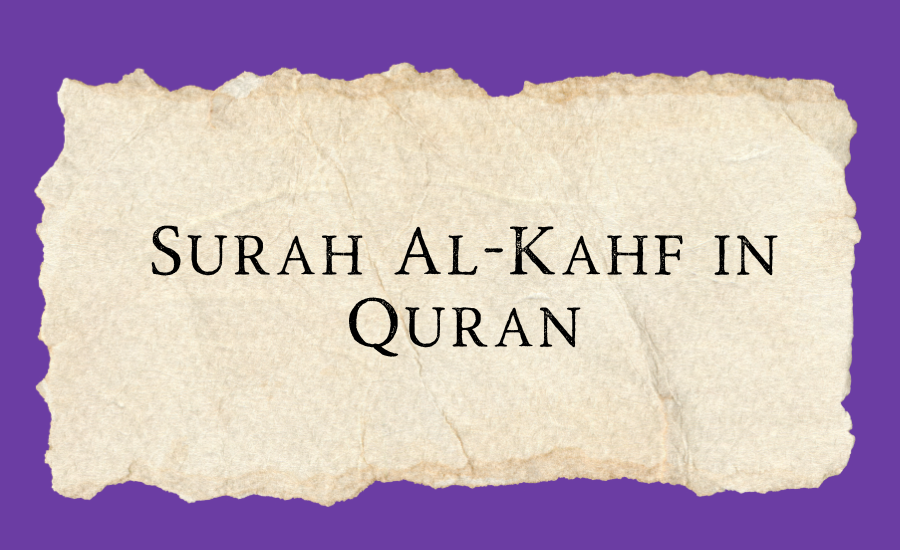Surah Al-Kahf (The Cave) is one of the most profound and powerful chapters of the Holy Quran, revealed in Makkah during a time of deep trial and reflection for the early Muslims. It is the 18th Surah, consisting of 110 verses, and holds timeless lessons about faith, knowledge, patience, humility, and protection from worldly and spiritual trials.
The name Al-Kahf, meaning the Cave, refers to the miraculous story of the young believers who took refuge in a cave to safeguard their faith. But beyond this story, the Surah contains four major narratives, each representing a different kind of test faced by every believer: the test of faith, wealth, knowledge, and power.
Surah Al-Kahf isn’t just a historical revelation; it’s a living guide for Muslims in every era. The Prophet Muhammad (peace be upon him) strongly encouraged believers to recite it every Friday, promising light, protection, and guidance until the next Friday. In today’s world filled with distractions, moral challenges, and spiritual trials, the Surah stands as a shield against deception, especially the greatest deception i.e. that of the Dajjal (Antichrist).
Reciting and reflecting on Surah Al-Kahf nurtures the heart, strengthens faith, and reminds every believer that no matter how dark the cave of life may seem, the light of Allah’s guidance always shines through.
Revelation and Background
Surah Al-Kahf was revealed during the Makkan period, a time when the early Muslims were enduring intense persecution, hardship, and trials of faith. Islam was still in its early stages, and the believers were being tested for their devotion, patience, and steadfastness. This Surah came as a source of strength, comfort, and divine reassurance for the Prophet Muhammad (peace be upon him) and his followers.
The revelation of Surah Al-Kahf is directly connected to a significant event. The leaders of Quraysh, who opposed the Prophet’s message, consulted the Jewish scholars of Madinah to challenge his prophethood. The Jews advised them to ask three specific questions that only a true prophet could answer:
- About the young men who disappeared long ago (the People of the Cave aka Ashab al-Kahf).
- About the righteous traveler who reached the east and west (Dhul-Qarnayn).
- The story of a man who traveled to learn from divine wisdom, referring to Prophet Musa (Moses) and Khidr.
In response, Allah revealed Surah Al-Kahf, addressing the first two questions directly and affirming divine knowledge regarding the third. Through this revelation, Allah not only confirmed the Prophet’s authenticity but also provided eternal lessons on faith, humility, and the unseen wisdom of Allah’s plan.
Each story in Surah Al-Kahf reflects the core challenges of human life — faith under trial, the temptation of wealth, the pursuit of knowledge, and the use of power. Together, these narratives serve as spiritual training for believers, teaching them how to remain guided and grounded amidst the tests of the world.
The Surah, therefore, is not merely a set of historical tales; it is a blueprint for resilience. Its message continues to inspire believers today, reminding us that true success lies not in worldly gain but in unwavering faith and trust in Allah.
04 Stories in Surah Al-Kahf
Surah Al-Kahf contains four remarkable stories, each revealing deep lessons about faith, patience, knowledge, and humility. These stories are not just historical accounts but timeless guidance for every believer facing trials in life.
1. The People of the Cave (Ashab al-Kahf)
The Surah begins with the story of young men who fled their city to protect their belief in Allah. They sought refuge in a cave, where Allah made them sleep for 309 years. When they awoke, they found their entire world changed.
Quranic Verse:
Arabic:
إِذْ أَوَى الْفِتْيَةُ إِلَى الْكَهْفِ فَقَالُوا رَبَّنَا آتِنَا مِن لَّدُنكَ رَحْمَةً وَهَيِّئْ لَنَا مِنْ أَمْرِنَا رَشَدًا
Transliteration: Idh awa al-fityatu ila al-kahfi fa qalu rabbana atina min ladunka rahmatan wa hayyi lana min amrina rashada.
Translation: “When the young men took refuge in the cave, they said: ‘Our Lord, grant us mercy from Yourself and prepare for us a right course in our affair.'” (Surah Al-Kahf, 18:10)
Lesson: This story reminds us that faith requires courage, and Allah protects those who stand firm for His sake.
Read the full The Story of the Cave in Surah Kahf here.
2. The Parable of the Two Gardens
This section describes two men i.e. one rich and proud, the other humble and grateful. The arrogant man boasted about his wealth, but his gardens were destroyed as a sign that worldly possessions are temporary.
Arabic:
وَاضْرِبْ لَهُم مَّثَلًا رَّجُلَيْنِ جَعَلْنَا لِأَحَدِهِمَا جَنَّتَيْنِ مِنْ أَعْنَابٍ
Transliteration: Wadrib lahum mathalan rajulaini ja’alna li-ahadihima jannataini min a’nabin.
Translation: “And present to them the example of two men: We granted to one of them two gardens of grapevines…” (Surah Al-Kahf, 18:32)
Lesson: True success lies in gratitude to Allah, not in wealth or status.
Read the full Story of the Two Gardens Surah Kahf here.
3. The Story of Musa (Moses) and Khidr
Prophet Musa (AS) was sent on a journey to learn divine wisdom from Khidr, a servant of Allah. Through a series of events, Musa learned that human knowledge is limited, and Allah’s wisdom encompasses all things.
Arabic:
فَوَجَدَا عَبْدًا مِّنْ عِبَادِنَا آتَيْنَاهُ رَحْمَةً مِّنْ عِندِنَا وَعَلَّمْنَاهُ مِن لَّدُنَّا عِلْمًا
Transliteration: Fawajada ‘abdan min ‘ibadina ataynahu rahmatan min ‘indina wa ‘allamnahu min ladunna ilman.
Translation: “So they found a servant from among Our servants to whom We had given mercy and taught him knowledge from Us.” (Surah Al-Kahf, 18:65)
Lesson: This story teaches humility and patience. Even prophets seek knowledge and accept that Allah’s wisdom is beyond human understanding.
Read the full story, The Story of Prophet Musa(AS) and Al‑Khidr(AS) here.
4. The Story of Dhul-Qarnayn
Dhul-Qarnayn was a just and powerful ruler who traveled across the lands helping people and establishing justice. He built a barrier against the tribes of Gog and Magog (Yajuj and Majuj) to protect humanity.
Arabic:
قَالَ هَذَا رَحْمَةٌ مِّن رَّبِّي
Transliteration: Qala hadha rahmatun min rabbi.
Translation: “He said: This is a mercy from my Lord.” (Surah Al-Kahf, 18:98)
Lesson: Power and authority are trusts from Allah, and true leadership comes with humility and service to others.
Read the full story, The Story of Zul-Qarnain in Islam, here.
Virtues and Benefits of Reciting Surah Al-Kahf
Reciting Surah Al-Kahf carries immense rewards and spiritual protection. The Prophet Muhammad (peace be upon him) emphasized its virtues, promising light, guidance, and safety from major trials, including the Fitnah of Dajjal.
1. Protection from the Dajjal (Antichrist)
The Prophet Muhammad (peace be upon him) said:
Arabic:
مَنْ حَفِظَ عَشْرَ آيَاتٍ مِنْ أَوَّلِ سُورَةِ الْكَهْفِ عُصِمَ مِنَ الدَّجَّالِ
Transliteration: Man hafiza ‘ashra ayatin min awwali Surah Al-Kahf usima min ad-Dajjal.
Translation: “Whoever memorizes ten verses from the beginning of Surah Al-Kahf will be protected from the Dajjal.” (Sahih Muslim, 809)
This hadith emphasizes the powerful protection that Surah Al-Kahf offers against the greatest trial of the Last Days, the Dajjal (Antichrist). Memorizing the first ten verses acts as a spiritual shield, strengthening faith and safeguarding the believer from deception. It reminds Muslims that closeness to Allah and His guidance is the ultimate protection in times of trial.
2. Light between Two Fridays
The Prophet Muhammad (peace be upon him) said:
Arabic:
مَنْ قَرَأَ سُورَةَ الْكَهْفِ فِي يَوْمِ الْجُمُعَةِ أَضَاءَ لَهُ مِنَ النُّورِ مَا بَيْنَ الْجُمُعَتَيْنِ
Transliteration: Man qara’a Surah Al-Kahf fi yawmi al-jumu’ah adaa’a lahu min an-noori ma bayna al-jumu’atayn.
Translation: “Whoever reads Surah Al-Kahf on Friday, a light will shine for him between this Friday and the next.” (Al-Hakim, Al-Bayhaqi)
This hadith highlights the immense spiritual reward of reciting Surah Al-Kahf on Fridays. The “light” mentioned symbolizes divine guidance, protection, and blessings that illuminate a believer’s life throughout the week. It serves as a reminder that consistent remembrance of Allah keeps one’s heart and path filled with faith and clarity.
3. Source of Guidance and Peace
Surah Al-Kahf acts as a spiritual compass for Muslims seeking peace and direction in life. Its recitation encourages reflection, strengthens faith, and reminds believers that Allah’s guidance is the ultimate light through confusion and trials. This Surah connects the heart directly to divine tranquility and steadfast faith.
Themes and Moral Lessons
Below are the significant themes and moral lessons from surah Al-Kahf:
- Faith over Fear: The youth of the cave trusted Allah completely.
- The Reality of the World: Wealth and status are temporary tests.
- Knowledge and Humility: Divine wisdom surpasses human reasoning.
- Justice and Leadership: Power must be used for good, as shown by Dhul-Qarnayn.
- Protection from Fitnah (Trials): This Surah guards believers from deception and disbelief.
Why Recite Surah Al-Kahf on Fridays
Reciting Surah Al-Kahf on Friday revives your iman (faith) and brings spiritual light for the coming week. It is a Sunnah that connects believers to the Quran, reminding them of the temporary nature of the world and the eternal reward awaiting the patient and faithful.
Surah Al Kahf Summary
Surah Al-Kahf is a beacon of light and wisdom in the Quran. Its stories teach believers to remain steadfast in faith, humble in knowledge, and grateful for every blessing. Reciting it every Friday brings light, protection from Dajjal, and continuous spiritual guidance. Every verse of this Surah reminds us that life’s tests are temporary, but Allah’s mercy and reward are eternal. It is sunnah to read Surah Al-Kahf every Friday to renew your faith, receive divine light, and gain protection from trials.
May Allah bless us with understanding, wisdom, and steadfastness through the lessons of Surah Al-Kahf. Ameen!
FAQs About Surah Al-Kahf
What is the main purpose of Surah Al-Kahf?
Surah Al-Kahf teaches lessons of faith, humility, patience, and trust in Allah. It warns against arrogance, ignorance, and attachment to worldly life.
When should Surah Al-Kahf be recited?
It is Sunnah to recite it every Friday, ideally between Thursday evening and Friday Maghrib.
How many verses are in Surah Al-Kahf?
Surah Al-Kahf has 110 verses (ayahs) and is the 18th chapter of the Holy Quran.
Which verses protect from Dajjal?
The first ten verses (and in some narrations, the last ten verses) of Surah Al-Kahf provide protection from the Fitnah of Dajjal.
What are the 4 main stories in Surah Al-Kahf?
The People of the Cave, The Two Gardens, Musa and Khidr, and Dhul-Qarnayn.
What happens when you recite Surah Al-Kahf on Friday?
You receive light, blessings, and protection from one Friday to the next, as mentioned in authentic Hadiths.
Is it necessary to read the whole Surah Al-Kahf on Friday?
It is recommended (mustahabb) to recite the entire Surah, but even reciting part of it, especially the first 10 verses, carries great virtue.
Can I listen to Surah Al-Kahf instead of reading it?
Yes, listening attentively to its recitation while reflecting on its meanings brings spiritual rewards and is encouraged when reading is not possible.






